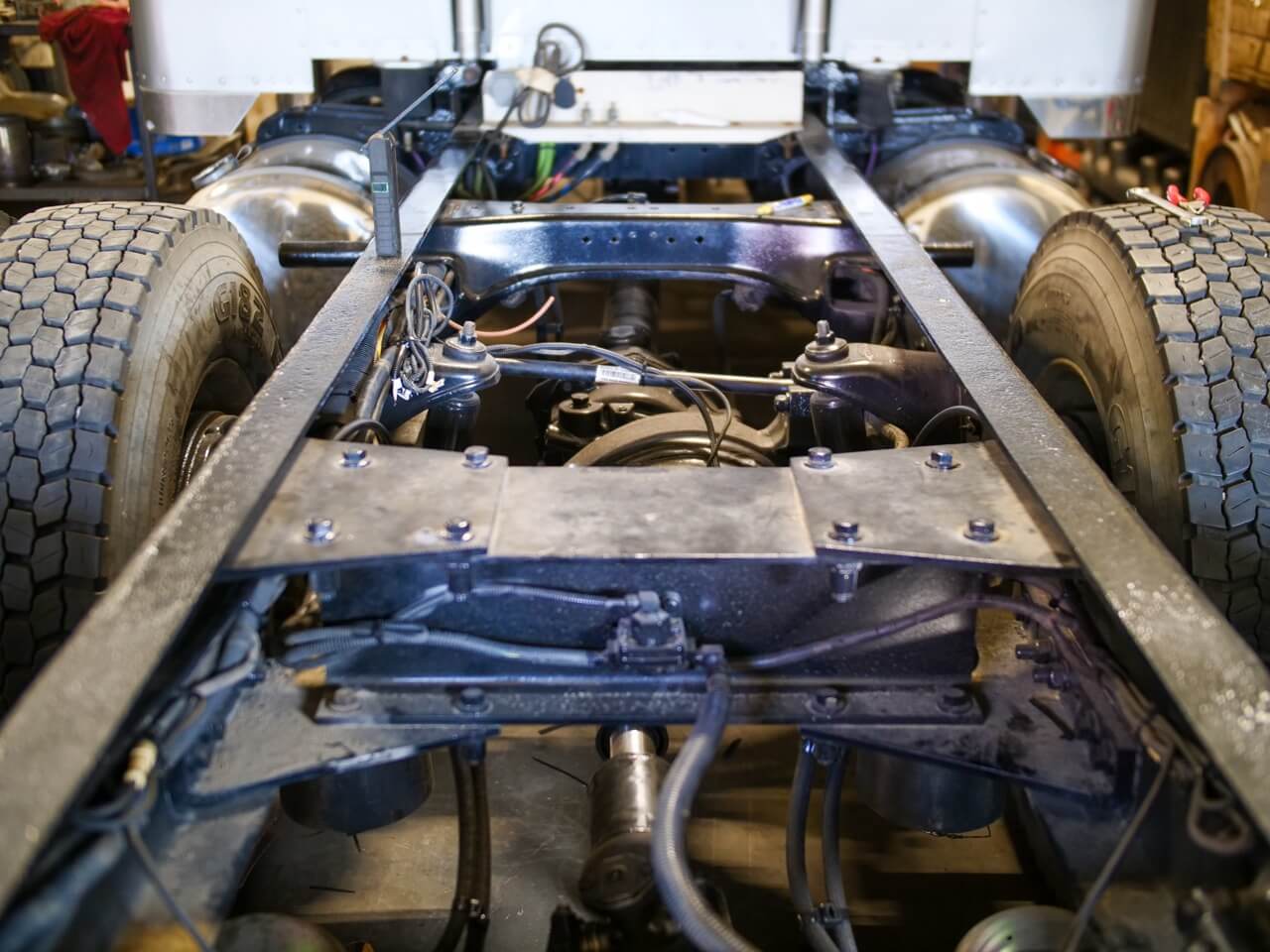How to Prevent Tow Truck Suspension Damage
Learn how to prevent tow truck suspension damage from overloading, rough roads, and poor maintenance. Protect leaf springs, air suspension, and shocks while staying compliant with DOT inspections.

The Role of Tow Truck Suspension
Tow trucks typically rely on two primary suspension types: leaf spring and air suspension. Each serves the same basic functions—supporting vehicle and payload weight, and absorbing shocks from the road—but in different ways.
- Leaf springs are curved metal blades that absorb and distribute weight. They're durable, affordable, and simple to maintain, but not the most forgiving when running empty.
- Air suspension, on the other hand, uses pressurized air bags and valves to fine-tune ride height and weight distribution. It’s smoother and more adaptable, but comes with a higher price tag and a more complex maintenance profile.
Regardless of the system type, regular inspections and preventative practices are your best defense against suspension damage.
Key Causes of Suspension Damage
Overloading and Uneven Weight Distribution
Overloading is a surefire way to prematurely wear out springs, air bags, and shock absorbers. Worse still, it can lead to catastrophic failures like leaf spring cracking or airbag blowouts. Tow trucks face this risk every day—especially if operators don’t account for tongue weight or improper load angles when hooking up vehicles.
Uneven distribution intensifies stress on certain corners of the suspension. When more weight sits over one axle than another, it overcompresses springs or air bags and throws off handling and alignment.
Actionable Advice:
- Always reference the tow truck’s Gross Vehicle Weight Rating (GVWR).
- Use load leveling equipment if available.
- Monitor and maintain tire pressure, which impacts load balancing.
Neglected Preventive Maintenance
Suspension systems require consistent inspections to stay in top shape. Yet it’s easy to overlook components like shock absorbers, control arms, and bushings, until symptoms like bounce, lean, or uneven tire wear appear.
With leaf springs, corrosion and fatigue cracks often start at mounting points like shackles and hangers. Air suspensions are vulnerable to air leaks, faulty height sensors, and compressor failure.
Actionable Advice:
- Schedule full undercarriage inspections every 10,000 miles or sooner if operating in severe duty.
- For air suspension, inspect air lines and bags for leaks using a soap solution.
- Replace shocks at the first sign of hydraulic fluid seepage or loss of dampening.
Operating on Poor Road Conditions
Potholed streets, gravel shoulders, and off-road terrain are all part of the job—but they’re also brutal on suspension parts. Repeated jarring leads to bushing degradation, shock shaft bending, and even cracked spring leaves or fractured mounting brackets.
Actionable Advice:
- Slow down over rough surfaces, especially when unladen.
- Invest in heavy-duty shocks with high dampening ratings.
- Use tire tread and pressure suited for mixed terrain.
Air Suspension-Specific Hazards
Tow trucks equipped with air suspension systems enjoy smoother rides and better adjustability. However, the system’s complexity makes it susceptible to air system contamination, compressor burnout, and electrical faults in height-control sensors.
Because these systems rely on components like the air compressor, air dryer, and control valves, even a small malfunction can ripple through the entire system—resulting in sagging, poor alignment, and even loss of control.
Actionable Advice:
- Replace air dryers regularly to prevent moisture contamination.
- Drain air tanks weekly to expel trapped water.
- Use OE-spec components to avoid compatibility issues with control modules.
Leaf Spring Weak Points
Though rugged, leaf springs aren’t invincible. Repeated overloading or side-loading can flatten the spring arch, create stress risers, and lead to fractures. Hangers and shackles often corrode and seize up, creating excess movement that prematurely wears spring eyes and bushings.
Actionable Advice:
- Inspect spring packs for corrosion, cracks, and uneven gaps.
- Grease spring hangers if equipped with zerks.
- Replace bushings when side-play is observed.
Shock Absorbers
Often overshadowed by springs and airbags, shock absorbers control rebound and dampen road vibrations. Without functioning shocks, suspension components slam to full extension or compression, accelerating wear. They also help maintain tire contact—critical for braking and steering under load.
Actionable Advice:
- Look for signs of oil seepage.
- Replace shocks in axle pairs, even if only one fails.
- Choose shocks rated for commercial-duty applications.
When to Upgrade or Retrofit
In regions like South Texas, where high heat and unpredictable conditions test every system, upgrading to reinforced suspension parts can be a wise investment. Options include:
- Progressive-rate leaf springs: better handling of variable loads.
- Heavy-duty airbags: increased PSI ratings and heat resistance.
- Shock absorbers with external reservoirs: greater thermal capacity for long hauls.
Retrofitting older tow trucks with modern air ride systems or enhanced bushings can also extend vehicle life and improve operator comfort.
Regular Suspension Inspections and DOT Compliance
During DOT inspections, the suspension system is scrutinized for damage, fatigue, and compliance with DOT standards.
Actionable Advice:
- Keep detailed maintenance logs for suspension work.
- Pre-inspect suspension before every cycle.
- Address warning signs like clunking, excessive sway, or uneven tire wear immediately.
Protect Your Suspension System
Preventing tow truck suspension damage starts with knowledge, continues with diligence, and ends with a safer, longer-lasting vehicle. By respecting load ratings, performing regular inspections, and understanding the weak points of both leaf spring and air suspension systems, operators can reduce downtime.
Industry Articles
Explore our articles on tips and recommendations for keeping your diesel vehicle or fleet in peak form!
Contact Texas Towing
Contact Texas Towing for professional 24/7, light to heavy-duty towing, roadside assistance, recovery services, & more in San Antonio and South Texas! Give us a call or fill out our service request form today!

%20(2).JPG)
.jpeg)
.jpg)